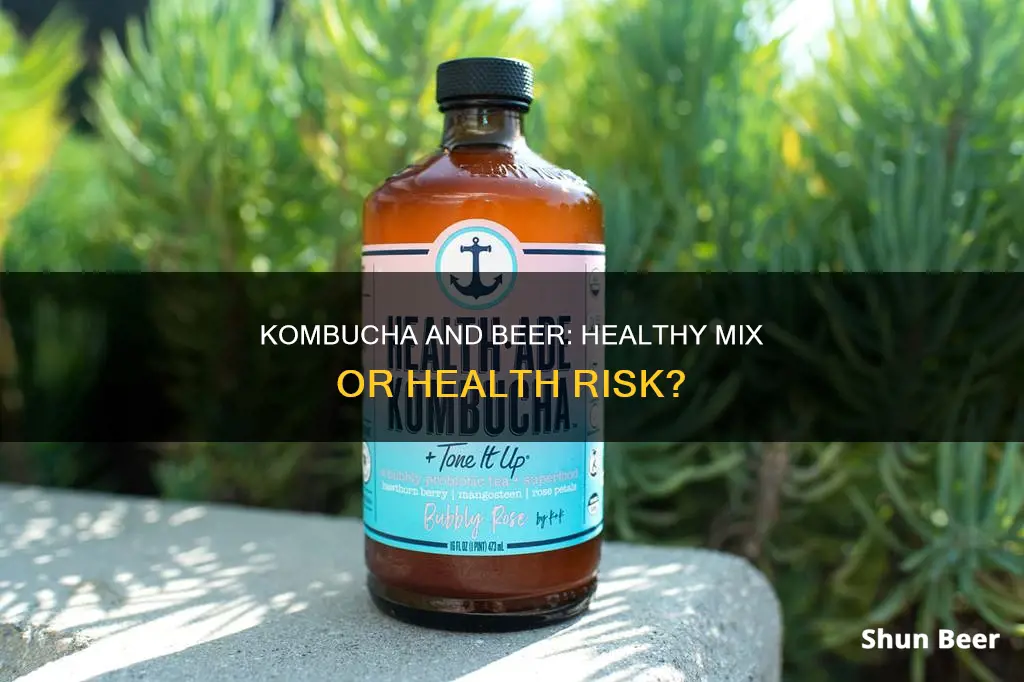
Kombucha is a fermented drink made from tea, yeast, bacteria and sugar. It has grown in popularity due to its reputation as a health and energy drink, with some believing it has many health benefits. However, there is limited research on the exact health benefits of kombucha. It contains a small amount of alcohol, typically below 0.5%, and is generally considered safe when consumed in moderation. On the other hand, beer is an alcoholic drink typically made from fermented grains and has a higher alcohol content than kombucha. So, is it okay to drink kombucha and beer? Let's explore this further.
| Characteristics | Values |
|---|---|
| Alcohol content | Kombucha contains a low level of alcohol, typically below 0.5% ABV. Beer, on the other hand, has a much higher alcohol content, typically ranging from 4% to 12% ABV or more. |
| Calories | Kombucha can range from low-calorie to high-calorie, with some brands containing up to 120 calories per bottle. Beer also varies in calorie content depending on the type and brand. |
| Caffeine | Kombucha contains a small amount of caffeine, usually less than 15 mg per cup, as it is made with caffeinated tea. Beer does not contain caffeine. |
| Sugar | Kombucha can be high in sugar, with some brands containing up to 28 grams of sugar per serving. Beer also contains sugar, but the amount varies depending on the type and brand. |
| Health benefits | Kombucha is known for its potential health benefits, including improved gut health, boosted immune system, lower cholesterol, and reduced risk of heart disease. Beer, in moderation, may have some health benefits, such as improved heart health and stronger bones. |
| Side effects | Excessive kombucha consumption can lead to digestive issues, bloating, and headaches. Beer consumption may also cause similar side effects, such as digestive issues and headaches, especially if consumed in large quantities. |
| Recommendations | It is recommended to consume kombucha in moderation, with a suggested limit of 4-8 ounces per day. Beer consumption guidelines vary, but it is generally recommended to drink in moderation to avoid negative health impacts. |
What You'll Learn

Kombucha's health benefits
Kombucha is a fizzy, fermented drink typically made with either green or black tea. It has been drunk for its health benefits for thousands of years. Here are some of its potential health advantages:
Probiotics and Gut Health
Kombucha is a good source of probiotics, which are beneficial bacteria that can improve gut health. The fermentation process produces live bacteria that may support gut health and contribute to improved microbiome health.
Improved Digestion
Fermented products are generally good for the gut and digestion. Probiotics help with constipation, diarrhea, and irritable bowel syndrome (IBS). Kombucha may also help reduce fat accumulation and lower triglyceride levels, which are linked to weight loss.
Boosted Immune System
Kombucha is made from black or green tea, which contain natural antioxidants that protect cells from damage. The fermentation process may increase these immune-boosting compounds. Additionally, the probiotics in kombucha can further strengthen the immune system.
Heart Health
Research indicates a link between gut health and heart health. Studies in animals show that kombucha lowers cholesterol and improves markers of heart disease, such as "bad" LDL and "good" HDL cholesterol.
Liver Health
Kombucha, especially when made with green tea, appears to have antioxidant effects on the liver. Regular consumption of kombucha has been found to reduce liver toxicity caused by toxic chemicals.
Blood Sugar Control
Kombucha has been shown to lower blood sugar levels in people with diabetes. It slows down the digestion of carbohydrates, which helps reduce blood sugar spikes.
Cancer Prevention
Kombucha is rich in antioxidants and polyphenols, which protect cells from damage and may help prevent the growth and spread of cancerous cells.
While kombucha offers these potential health benefits, it's important to consume it in moderation as part of a balanced diet. Excessive consumption may lead to issues such as bloating, digestive distress, and excessive sugar or calorie intake.
Beer and Tums: Safe Mix or Not?
You may want to see also

Kombucha's side effects
Kombucha is generally considered safe, but there are some side effects to be aware of, especially if you're drinking large amounts. Here are the potential downsides of drinking kombucha:
Digestive Issues
Kombucha is carbonated and contains compounds called FODMAPs, which are specific types of carbohydrates that can cause digestive issues like bloating, gas, and diarrhoea, especially in people with IBS. The high sugar content of kombucha can also contribute to these issues.
Excess Calories and Sugar
Kombucha can be high in calories and sugar, and consuming too many high-calorie drinks can lead to weight gain. Excessive sugar intake can also negatively impact your health in other ways, increasing the risk of diabetes, obesity, fatty liver, and heart disease.
Dangerous for Certain People
Kombucha can cause severe side effects in some people. Because it's unpasteurized and contains a mix of bacteria and yeasts, it can promote the growth of opportunistic bacteria that can lead to infections in those with weakened immune systems, such as people with cancer, kidney disease, or HIV. Pregnant and breastfeeding women should also avoid kombucha due to its small amounts of caffeine and alcohol.
Excess Caffeine Consumption
Kombucha is usually made with black or green tea, which naturally contain caffeine. While the caffeine content is low, consuming large amounts of kombucha can lead to excess caffeine intake, potentially causing anxiety or jitteriness, especially in those sensitive to stimulants. Drinking kombucha close to bedtime may also disrupt sleep.
Other Potential Risks
Drinking too much kombucha could potentially lead to reactions like headaches, nausea, and going into ketoacidosis (a medical emergency with too much acid in the blood). Lead toxicity is also possible if homemade kombuchas are fermented in clay vessels or other containers that leach lead. Sanitation is another concern with homemade kombucha, as it can become contaminated with undesirable fungi and yeast.
Beer: Antifreeze Poisoning Cure or Dangerous Myth?
You may want to see also

Who should avoid kombucha
Kombucha is generally considered safe and can be part of a balanced diet. However, there are certain groups of people who should avoid drinking kombucha due to potential health risks. Here are the categories of individuals who should refrain from consuming kombucha:
- Pregnant and breastfeeding women: Kombucha contains small amounts of alcohol, which can pose risks to pregnant women and their babies. Additionally, the caffeine levels in kombucha may not be advisable for mothers-to-be and breastfeeding mothers. There is also a possibility of bacterial contamination, especially in homemade kombucha.
- Individuals with weakened immune systems: Those with compromised immune systems, such as people with cancer, kidney disease, HIV, or other chronic illnesses, should avoid kombucha. This is because kombucha contains a mix of bacteria and yeasts that can promote the growth of opportunistic pathogens, leading to severe infections in immunocompromised individuals.
- People with caffeine sensitivity: Kombucha is typically made with green or black tea, which naturally contain caffeine. While the caffeine content in kombucha is relatively low, it can still affect individuals who are sensitive to caffeine or those trying to limit their caffeine intake.
- Individuals with liver disease: There have been reports of liver complications and toxicity associated with kombucha consumption. Those with existing liver conditions should exercise caution and consult their healthcare provider before consuming kombucha.
- Children: Due to the presence of caffeine and alcohol, kombucha is not recommended for children. While older kids may consume it occasionally, experts advise limiting their daily intake.
- Individuals with diabetes: Kombucha contains sugar and can affect blood sugar levels. Those with diabetes should monitor their blood sugar closely and consult their healthcare provider before consuming kombucha.
- Individuals prone to digestive issues: Kombucha is carbonated and contains compounds called FODMAPs, which can cause digestive distress, bloating, and diarrhoea, especially in people with IBS or other gastrointestinal conditions.
- Individuals with allergies: There have been rare cases of severe allergic reactions to kombucha. If you have known allergies or sensitivities to any of the ingredients in kombucha, it is best to avoid it.
Drinking Beer by the Pool: Is it Allowed?
You may want to see also

Kombucha's sugar content
Kombucha is a fermented drink, typically made with green or black tea. The fermentation process requires sugar to feed the yeast and bacteria (SCOBY) that create the fizz and tanginess of the drink. While the exact sugar content of kombucha varies depending on the brand and brewing method, an average home-brewed kombucha typically has around 4-6 grams of sugar per 8 ounces, which is lower than most other beverages.
The sugar content in kombucha can be influenced by several factors, such as the type of sugar used, the duration of fermentation, and the temperature at which it is fermented. Using organic cane sugar or white cane sugar is ideal for kombucha, as they are unbleached and have a low mineral content. In contrast, brown sugar may harm the SCOBY and result in an overabundance of yeast.
Extending the fermentation time can also reduce sugar content, as the yeast consumes more sugar over time. However, this can lead to a more vinegary taste. Diluting the kombucha with water or tea before drinking is another way to lower the sugar content without increasing fermentation time.
While kombucha does contain sugar, it is important to note that the fermentation process breaks down the sugar, and the residual sugar is mostly broken down, making it easier for the body to process. Additionally, the sugar is primarily consumed by the SCOBY, not by the person drinking the kombucha.
Overall, while kombucha does contain sugar, the amount is relatively low compared to other beverages, and the fermentation process reduces the sugar content further. However, it is important to consume kombucha in moderation, as excessive consumption may lead to digestive issues and other negative side effects.
The Ultimate Beer Snorkel Experience: How Does It Work?
You may want to see also

Kombucha's alcohol content
Kombucha is a fermented drink, typically made with green or black tea, sugar, and bacteria. The fermentation process creates a small amount of alcohol in the drink—usually about 0.5% ABV or less. This means that kombucha is considered a non-alcoholic beverage and can be sold as such.
However, it's important to note that the alcohol content can vary depending on the brand and brewing method. For example, some types of kombucha have a higher alcohol content and are considered alcoholic beverages. Additionally, home-brewed kombucha may have a higher alcohol content if it is not prepared properly.
Due to its low alcohol content, kombucha is generally safe for most people to consume. However, it is not recommended for individuals who are avoiding alcohol due to dependence challenges, pregnancy, breastfeeding, allergies, or medication interactions. It is also not advised for young children or those with compromised immune systems.
Overall, kombucha's alcohol content is typically low, but it's important to check the label and be mindful of potential variations, especially when consuming multiple servings or home-brewed varieties.
Celiac and Beer: What's Safe to Drink?
You may want to see also
Frequently asked questions
Drinking kombucha and beer is generally not recommended. While kombucha has many health benefits, such as improving gut health and boosting the immune system, it also contains a small amount of alcohol and caffeine. Beer, on the other hand, contains a higher amount of alcohol, which may not be safe when consumed together with kombucha. Additionally, both drinks can be high in calories and sugar, which can contribute to weight gain and other health issues. It is important to consume them in moderation and be mindful of their potential side effects.
Kombucha is a fermented drink that has been consumed for over 2,000 years and is known for its potential health benefits. It contains probiotics, antioxidants, and B vitamins, which can improve gut health, boost the immune system, and reduce inflammation. However, there is limited scientific research to support all the health claims made by manufacturers and enthusiasts.
While kombucha is generally considered safe for most people, there are some potential side effects and risks. It may cause digestive issues, bloating, and excessive calorie consumption due to its high sugar and caffeine content. It is also unpasteurized and contains small amounts of alcohol, which can be dangerous for pregnant women, breastfeeding mothers, and those with weakened immune systems. Additionally, drinking too much kombucha can lead to reactions such as headaches, nausea, and GI distress.







